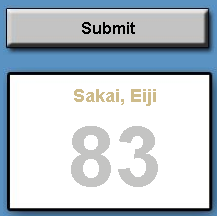"Why are Japanese companies so slow in decision-making?"
"I never know who is responsible for what in Japanese companies."
These are common complaints made by foreigners who conduct business with Japanese companies. Even Japanese people including me often feel frustrated in the same way.
Japanese companies can be very different from those in the West. A Japanese company does have a organizational chart that is very similar to one in a western company. However, the way they actually operate is very different. In a Japanese company, its formal hierarchical organizational chart is less relevant than its informal power structure. In Japan, power is much more spread toward the lower rank than in the West. More than often, a Japanese boss can be a mere symbol that integrates his or her section rather than an active leader who command his or her employees. You can recall the position that the Japanese emperor occupies in the constitution. Probably, this implies something more than only a coincidence.
Even if you are a businessperson in negotiation and have reached an agreement with a person who is supposed to have authority in a Japanese company, therefore, you can never feel relieved. His or her promise will not fulfilled unless his or her boss, coworkers and even subordinates in the company also agree with it. People have to go through a prolonged process of soliciting supports from other "interested parties" in the same company. This process is called "nemawashi" in Japanese, and one of the most important techniques you have to be proficient in to get work done in a Japanese company.
Cumbersome as it might look, the lengthy solicitation process or nemawashi has a positive aspect. Unlike an imperative working environment in the West, Japanese employees are encouraged to participate in decision making processes even if they are low-ranking. Japanese employees can have a high morale and feel that "we are supporting our own company". This mechanism seems to have worked very well until 1990 when Japanese economy enjoyed a rapid development.
However, the serious pitfall of this "all-participatory management" is that it is very obscure who has real authority and responsibility. When a company has to embrace a drastic change, it suddenly becomes paralyzed. Since nobody seems to take a responsibility, it is extremely hard for the company to make a risky but potentially profitable decision. Nobody takes initiative. Every single employee becomes quite conservative and sticks to status quo as much as possible, even if they are subconsciously aware that things won't last forever.
In a nutshell, this is where we Japanese are. These phenomena are quite pervasive and can be observed in every single aspect of Japanese society now. Probably, many people outside of Japan have already realized how ineffective Japanese politics are. This is only one example of the wide spread "indecisiveness syndrome" that inflicts Japanese society.
As a Japanese national, I long for the solution that addresses to this problem. However, I am also aware, with a little resignation, that it will take a long time before Japan gets rejuvenated by overcoming this issue because the problem runs deep in the very Japanese culture itself.





